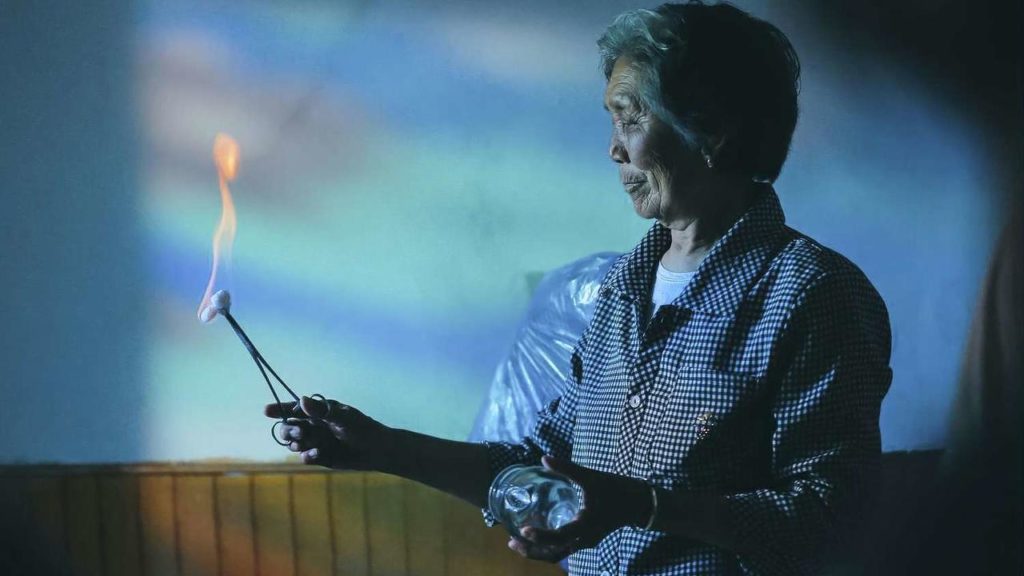Reflective, beautiful, monotonous, and kind of fun, Bi Gan’s directorial debut Kaili Blues manages to fuse genres together to create something that, while undoubtedly poetic, allows itself to breathe. Much less a story of time and place than a dissection of the role of time and place themselves, the film plays out like a dream that invites you to join in on its muddled bliss.
The film is laced with poetry, both literally and visually, so it only makes sense that Bi Gan would set the tone of the film with this excerpt from The Diamond Sutra as the opening message: “Neither the past, present, nor future can be found.” I just wish I’d known how literally I should have taken this.
The plot — a term that should be used loosely — centers around reformed ex-con Chen (Yongzhong Chen) as he tries to rescue his nephew Weiwei (Feiyang Luo) from the neglect of his father, who is consistently referred to as Crazy Face (Lixun Xie). Still, the film does not attach itself to any one theme or genre; crime, family drama, mystery, horror stories of “wild men,” and romance are certainly themes, but they cannot pervade over the melodic, dreamlike haze that Bi Gan so elegantly casts.
Watching Kaili Blues feels like a lot like floating. Just like in your own dreams, you begin to accept Bi Gan’s stream of consciousness storytelling with acceptance and a passive intrigue. Cinematographer Tianxing Wang (also his remarkable debut) perpetuates this feeling with his impeccable camerawork in every scene. Every shot seems to be meticulously crafted, shifting from natural saturated colors in the landscapes to delicate, dancing neon bouncing off disco balls. We frequently pan our way 360-degrees through scenes where the blocking of the actors and asynchronous sound disconnect us from fully understanding the conversations, or even who is speaking — but once again, it doesn’t matter. After all, this weaving in and out of reality is the bread and butter of Kaili Blues.
Despite this being his first film, Bi Gan clearly isn’t afraid to take risks, as seen in his spectacular 41-minute handheld long take that completely ignores the stylistic and thematic choices that seem so deliberate in the rest of the film. There’s no poetry, no slow panning, no dazzling stained glass shadows casting light. There are enough depth-perception-altering stabilizer moments to make you dizzy, and the quality shifts from state-of-the-art-flawless-beauty to live-television-journalist-frame-rate-disaster for the entire duration of the take. As far as the plot goes, it’s the scene that is able to rope most confused viewers back in. While it still aesthetically continues the dreamlike flow of the other 2/3s of the film, the long take forces a more cohesive narrative by the nature of a continuous shot following a character on a journey. As soon as it’s over, we’re thrown back into Bi Gan’s fragmented world, wondering if we ever received any clarity in the first place.
While it would be a crime to not compare Bi Gan’s work to that of beloved auteurs like Apichatpong Weerasethakul (unexpected surrealism in the most mundane of scenarios), Abbas Kiarostami (omission of on-screen action to add reflection), and Hou Hsiao-Hsien (because the train scene was too beautiful an ode), it’s important to note that he is also distinctly modern. Maybe it’s his age — a whopping 20-something – or maybe he’s just ambitious, but Bi Gan’s willingness to take ballsy directorial risks gives Kaili Blues a sense of fun and accessibility that is often hard to come by within the genre. Kaili Blues was a breath of fresh air.
Addled in its idiosyncrasies, Kaili Blues toes the line between reality and dreams in a way that challenges what is expected from a film. I left the theater confused, satisfied, and trying to figure out if I’m in just floating by in an elaborate Bi Gan long take. I’m still working on that last part.
Kaili Blues
2015
dir. Bi Gan
113 min.
8/5-8/8 @ Brattle Theatre


